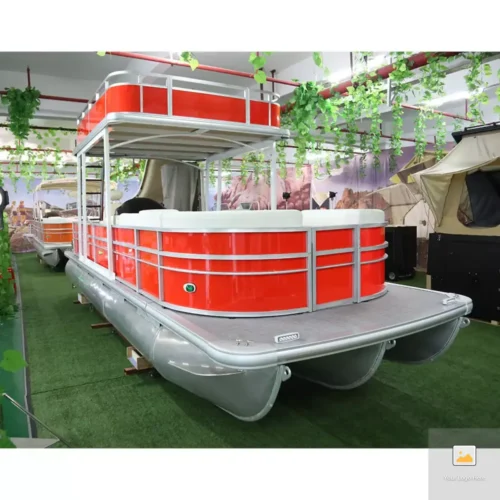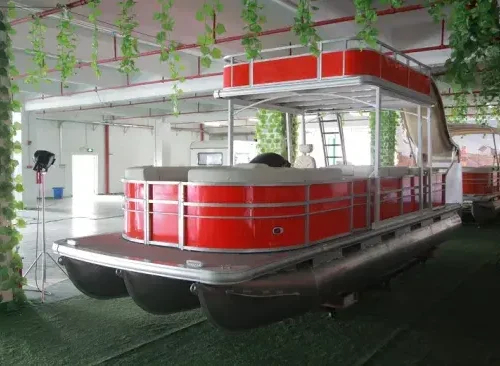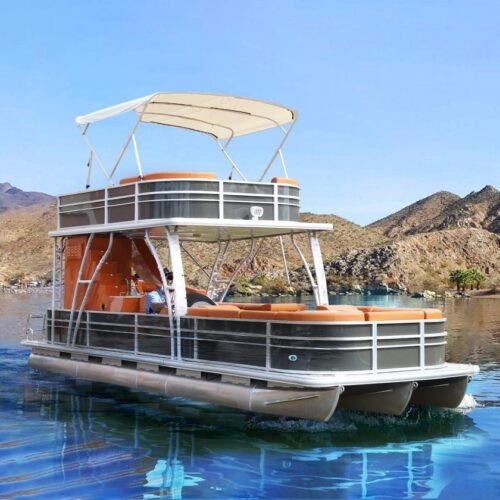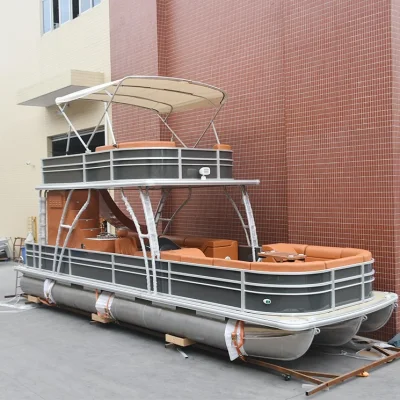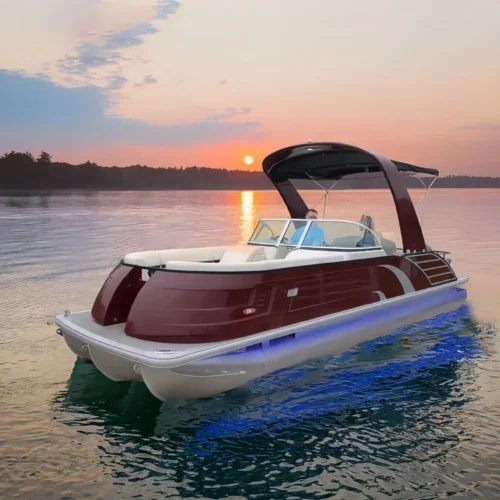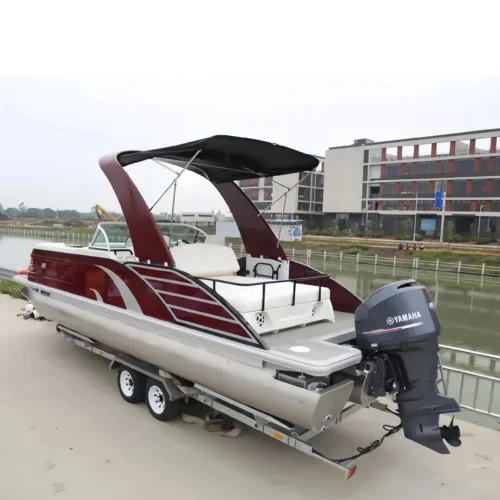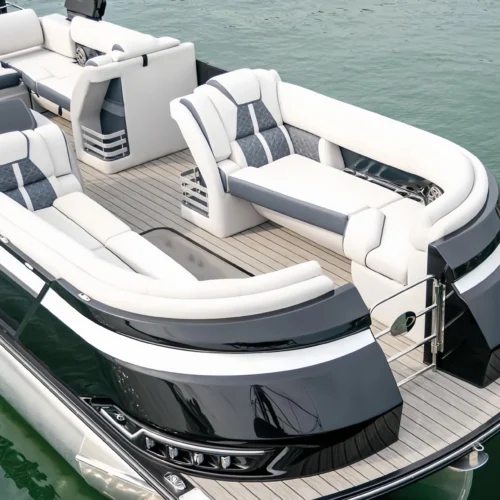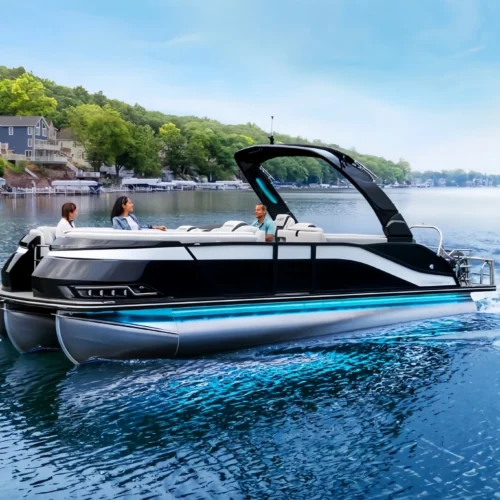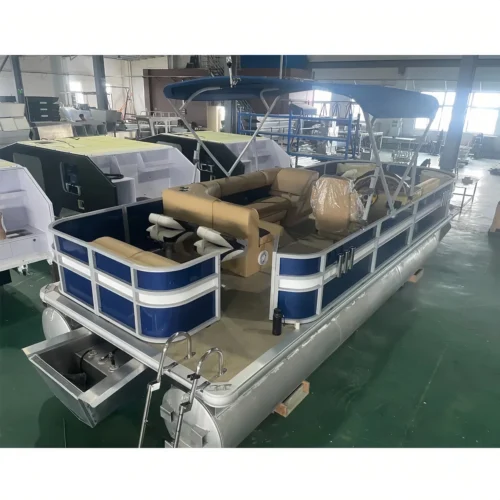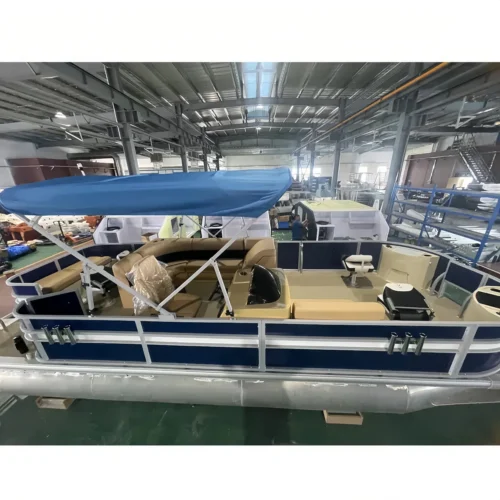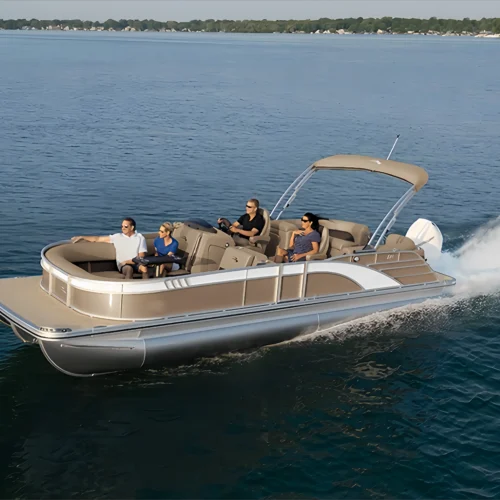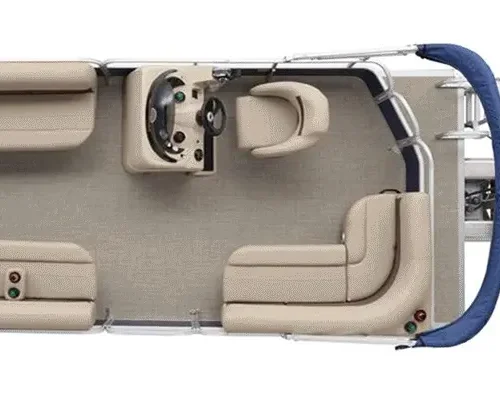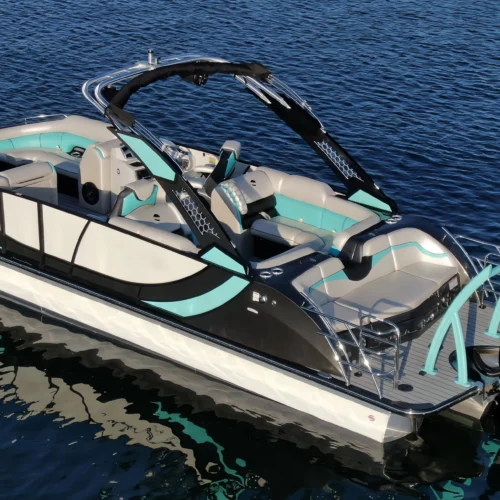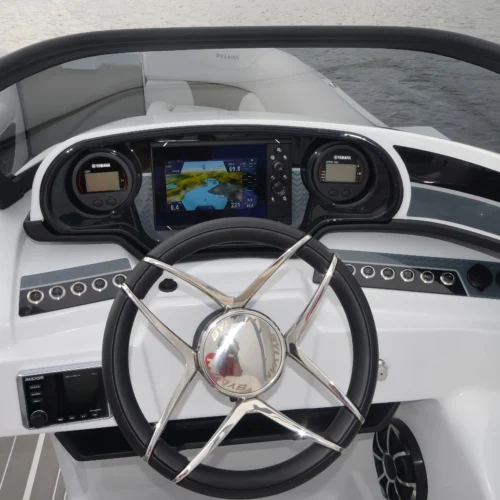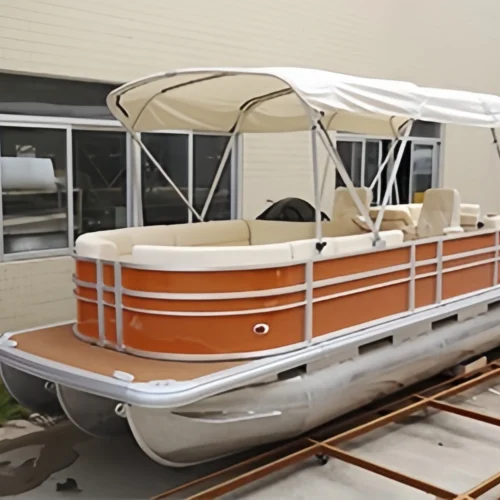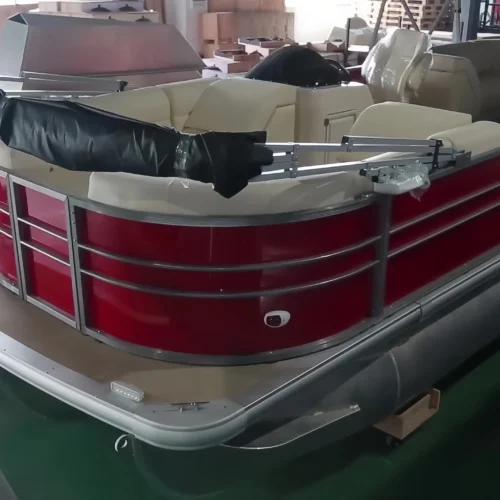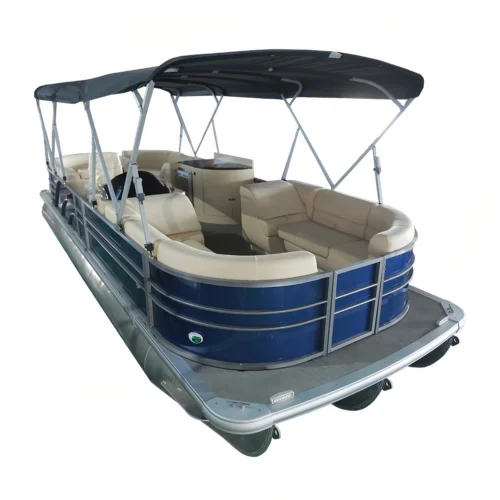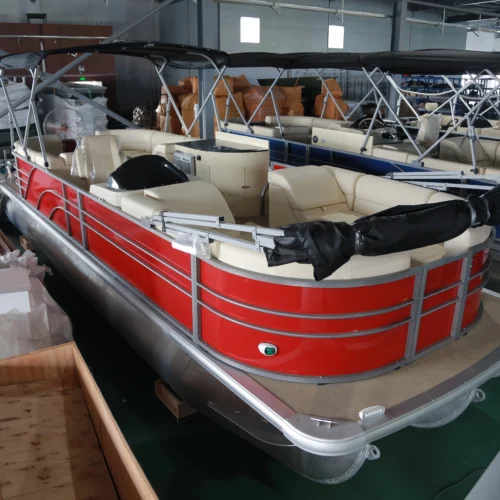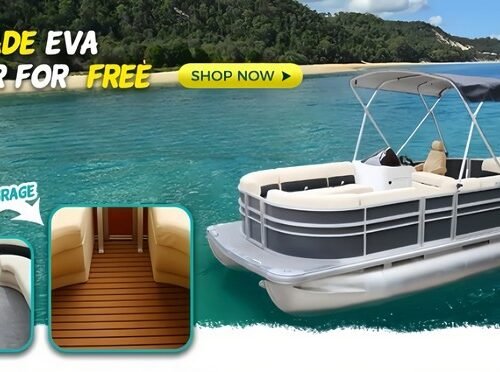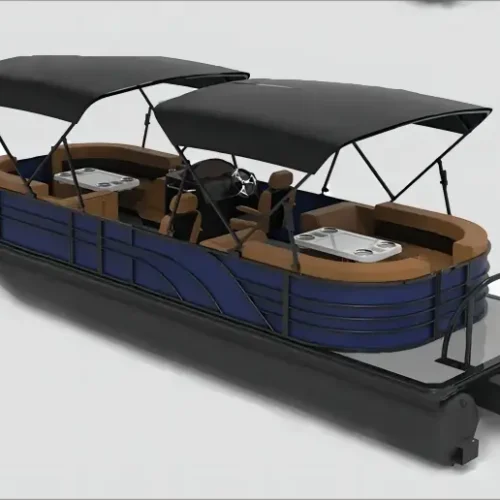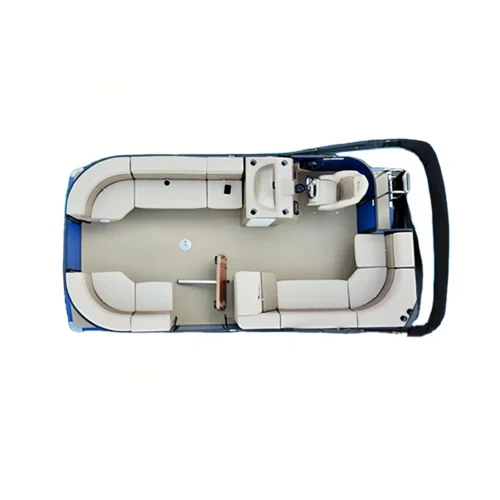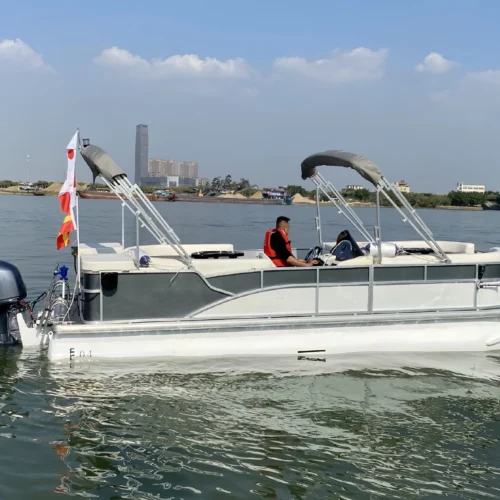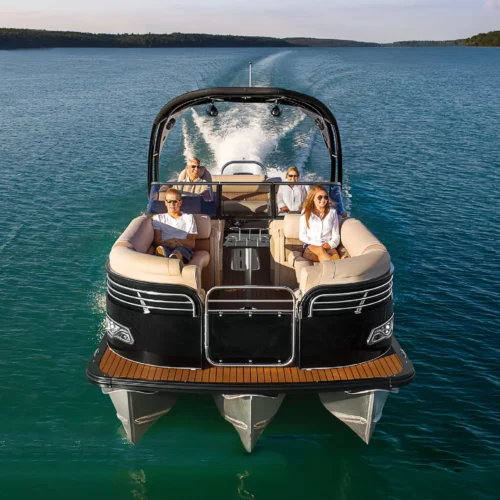Pontoon Boat FAQs
1. What is a pontoon boat?
Pontoon boats are one of the most popular off-water vessels for people in the United States and Canada.
With two or more stout pontoons and a spacious, open deck, pontoon boats offer added comfort for large group gatherings.
Based on the flat-bottom and shallow-draft design, pontoon boats are usually active in lakes, rivers, ponds and other still, light water areas.
The open deck area allows pontoon boat users to have more activity areas and storage space. This design allows a family to bring more equipment or things to enjoy a full day on the water.
This is because in addition to the common bench lounge, the boats are also available with other equipment such as standing bars and fishing chairs. As a result, they are often used for water sports, recreational cruising and numerous recreational activities such as fishing.
2. How much is a pontoon boat?
It is easy to understand that the price of pontoon boats can vary depending on the size, material, function and brand. As the most popular civilian boat, the price of pontoon boats is moderate.
We have also done market research and typically start at $20,000 for a small basic pontoon boat and around $50,000 for a medium-sized pontoon boat with added features. Of course, it is not uncommon for those larger, high-end pontoon boats to cost more than $60,000 or even $100,000.
Fortunately, via NeoBoats, which has hundreds of boatyard partnerships, all boats are priced away from the brand premium. Most of our pontoon boats have a lower starting price than any brand name pontoon boat we have ever seen.
Both the simple fishing pontoon boats and the more complex luxury pontoon boats are priced lower than many used pontoon boats. If you need one, please contact us with your requirements and you will have the best pontoon boat at the most affordable price.
3. How much does pontoon boat weigh?
As with boat prices, weight tends to have a strong relationship to characteristics like size, material and features.
Obviously, the larger the size of the boat, the heavier it will be, and the more delicate the boat's construction materials are, the heavier the boat will be. Even the lightest pontoon boats can weigh over 1,000 pounds, but of course it is usually the mini pontoon boats and aluminum boats that have such a light mass.
In fact, we have done data on the weight of most pontoon boats on the market. For small pontoon boats (16 ft pontoon boat - 19 ft pontoon boa), a weight of 1,000-2,000 lbs is more normal.
For 20 ft pontoon boat to 22 ft pontoon boat, the weight is usually maintained around 2,000-2,500 lbs.
Of course, as the size increases, so does the weight of the pontoon boat. For example, a medium to large 23 to 25' pontoon boat will increase in weight to 2,500-3,500 pounds, while an oversized 26 to 30 foot pontoon boat will weigh more than 3,500 pounds, or even up to about 4,500 pounds.
Therefore, transporting these heavy vessels is usually also a problem for the users. You can avoid all these problems by ordering a trailer for your boat at the time of purchase.
Commendably, at NeoBoats, most of our pontoon boats support customized pontoon boat trailers for easy transportation and storage of the boats.
4. How wide is a pontoon boat?
In addition to the price and weight of boats, their width is usually an issue of great concern. In fact, on boats, we usually refer to the width of the boat as the "beam".
Since the U.S. Department of Transportation has restrictions on the maximum width of pontoon boat trailers, pontoon boat beams are also usually limited to between 8 and 10 feet. Fortunately, this width range is sufficient to provide more options for boat stability and visitor activities.
5. Can pontoon boats go in the ocean?
I'm sure there are users who, after seeing the properties of marine grade aluminum, the most commonly used material for boat construction, have thought of going out on the ocean to sail a pontoon boat.
But the fact is that pontoon boats are not good at handling this kind of choppy waters on the ocean.
Although pontoon boats technically support ocean exploration, their flat-bottom, shallow-draft design makes ocean travel impractical. Just as a plank floating on the water is susceptible to movement from wind and waves, pontoon boats cannot withstand the ravages of any wind or wave.
In an ocean with complex and changing water conditions, pontoon boats are very prone to capsize.
In addition, for pontoon boats, which usually use outboard motors as their power source, the corrosion of machinery by salt water can be quite frightening.
Therefore, we do not recommend that any user operate a pontoon boat on the ocean.
Advisably, users should stay away from the ocean, both for the safety of the crew and out of concern for the longevity of the vessel.
6. How to drive a pontoon boat?
In fact, like driving most common boats, driving a pontoon boat is not difficult. Because a pontoon boat is more stable, it is also easier to operate.
Of course, even though it is not a difficult task, we still recommend that you take a systematic driving training and get a driving qualification.
Normally, the captain should perform a thorough safety check of the boat, including the engine, electrical system, and life-saving equipment such as life jackets and fire extinguishers, before sailing.
Of course, checking the weather ahead of time and having a good route strategy can also greatly improve the safety factor of the trip.
Starting a boat is probably familiar to most people because it is as easy as starting a car.
Once the engine starts, you can slowly open the throttle and then use the steering wheel to turn the boat. It is worth noting that the boat is steered from the stern, unlike a car, which is driven from the front. This also makes the boat go slower and takes longer to turn.
Of course, the boat has no brakes and cannot brake in an emergency. Therefore, both braking and docking require more patience from people.
7. How many people can fit on a pontoon boat?
Ship size and layout undoubtedly have a direct bearing on performance. Generally speaking, the capacity of pontoon vessels has an advantage over other vessels of the same size. This is because the open layout, flat bottom deck and open design allow the boats to have more space to accommodate. Even the smallest pontoon boats can usually accommodate about 6-8 people, not to mention the larger size of those luxurious pontoon boats that can accommodate groups of 15 people or more.
Of course, we have done the statistics and found that most of the 16-20 feet small pontoon boats have a capacity of about 6-10 people. And the medium-sized pontoon boats of 21-26 feet are usually suitable for groups of 10-15 people. In addition, the super large pontoon boats of 27 feet or more, with proper layout and design, can accommodate up to 15-25 people.
If you still don't know exactly what size boat you should buy, please contact us right away. Tell us what you need and we will be happy to help you choose the best boat.
8. Are pontoon boats safe?
Thanks to the reliable pontoons and the wide pontoon boat deck, pontoon boats are usually considered safe.
This design greatly increases the stability of the boat on the water. Of course, like any other type of boat, pontoon safety depends on good objective conditions.
First of all, every captain should keep in mind that pontoon boats are designed for calm waters such as lakes and rivers. There is no guarantee that they will remain stable in rough seas.
Second, it is also important to choose a sunny, windless day for the trip, as the flat-bottomed design of pontoon boats makes them susceptible to wind. Then, please note that the skipper follows safety guidelines for boating, based on mastery of boating skills.
Of course, keeping the boat's load within its maximum carrying capacity is also an essential guarantee of safety.
Finally, regular maintenance of the pontoon boat's engine and hull, and ensuring that the boat prepares adequate safety and survival equipment before official departure are also essential safety steps.
9. How fast do pontoon boats go?
We must admit that pontoon boats are not designed for the pursuit of speed. Because their objective is to make passengers feel and enjoy the comfort, from the shape design to the motor selection.
Usually, some pontoon boats, equipped with medium engine power, have a speed of around 15-25 mph, which is sufficient for recreational, cruising or fishing activities.
Fast pontoon boats with large outboard motors can reach speeds of 40-60 mph at best.
Of course, this does not mean that pontoon boats can participate in high-speed paddling or racing. Too much speed is dangerous for pontoon boats.
10. Can you ski behind a pontoon boat?
For outdoor sports enthusiasts who enjoy water skiing, choosing a pontoon boat as professional water skiing equipment may not be the best choice. However, this does not mean that pontoon boats cannot be used for water skiing.
Pontoon boats that make a casual lifestyle a staple are not the best option for water skiing, as they usually don't produce much of a splash. However, for those pontoon boats equipped with outboard motors of 90-115+ horsepower, water skiing can still be a pleasure. The boat can easily pull the athlete over the stern to make a nice splash, and while not as dazzling as a professional water ski, it is enough to satisfy the amateur's recreational pastime.
11. How shallow can a pontoon boat go?
As a common shallow water vessel, pontoon boats also typically have a very shallow draft - 1 to 2 feet. As a result, pontoon boats are usually quite safe when navigating shallow lakes and rivers.
Of course, when really navigating a pontoon boat in shallow water, the captain should always be aware of the depth of the waterway and underwater obstacles to avoid unnecessary damage to the boat.
12. Are pontoon boats good for fishing?
If you want to have a comfortable and enjoyable leisure trip with fishing activities as a pastime, then there is nothing wrong with choosing fishing pontoon boats.
On the contrary, if you are a dedicated angler and just want to have a professional fishing boat, then fishing pontoon boats may not be the optimal option.
Undoubtedly, most fishing pontoon boats are a "two-in-one" existence. They not only contain what is needed for fishing on the water, but also have a lot of space reserved for recreation and relaxation of passengers.
The advantage is that it gives more comfort to the angler and also facilitates him or her to stay with the recreational team.
However, for hard working anglers the recreational equipment of pontoon fishing boats may be unused.
Secondly, pontoon fishing boats are slower and less maneuverable than professional fishing boats with V-shaped designs, which may reduce the efficiency of anglers' trips.
Therefore, for those who want to both attend a family gathering and catch their prey on the water, fishing pontoon boats will double the pleasure.
And for those professional fishing groups, it is more convenient to choose the more professional bass boats or bay boats.
13. What is a tritoon pontoon boat?
Compared with the traditional double-tube pontoon boat, the tritoon pontoon boat is more stable with the help of an extra tube to increase the comfort of passengers.
With the additional auxiliary float tube in the middle, the tritoon pontoon boat has more buoyancy to stay stable, especially in rough water conditions.
With the extra tube, the Tritoon pontoon boat will also support a larger engine, making it more agile in both speed and maneuverability.
This is why many high-performance water sports themed luxury pontoon boats go for this design.
At first glance, the choice of a tritoon pontoon boat seems to be more reliable than the traditional pontoon boat.
But to talk about the advantages apart from the operating costs is a bit of a trick. The extra tubes bring comfort and at the same time mean higher construction costs, fuel consumption and docking costs.
It is worth mentioning that the stability advantage of the Tritoon pontoon boat becomes worthless in calmer waters.
14. How to choose a pontoon boat?
Admittedly, choosing the best one for you among the wide variety of pontoon boats is a more tangled process.
If you are planning to buy a boat, please clarify the purpose of your boat purchase first. For those who want to relax on the lake with friends and family, a party pontoon boat with a casual theme is a good choice.
If you also need to add some fishing fun, then fishing pontoon boat is more suitable.
Of course, if you and your group are expecting more functionality and comfort, choosing luxurious pontoon boats may be more in line with your needs.
After considering the purpose, it is also crucial to calculate the number of friends and family you need to consider. This is because different sizes of boats represent different carrying capacities.
For a small group of 6-10 people, choosing a 16-20 foot pontoon boat is sufficient. If you have a group of 10-15 people, then a 21-26 foot pontoon boat will be more spacious.
Of course, for groups of 15 people or more, a super large pontoon boat of 27 feet or more will be more suitable.
Admittedly, we can not ignore a practical issue - budget. For those have enough budget, choosing a new, high-end pontoon boat will make the trip more enjoyable.
And for a group on a budget, a used pontoon boat may enter the perspective first. But the fact is that most used pontoon boats mean a lower purchase price and we will simply overlook their subsequent maintenance and refurbishment costs.
Fortunately, via NeoBoats, the price of a used boat means a brand new cost-effective pontoon boat.
Of course, there are more realistic factors that we need to consider when buying a boat. If you would like to learn more, please contact us and we would be honored to help you with our expertise.

